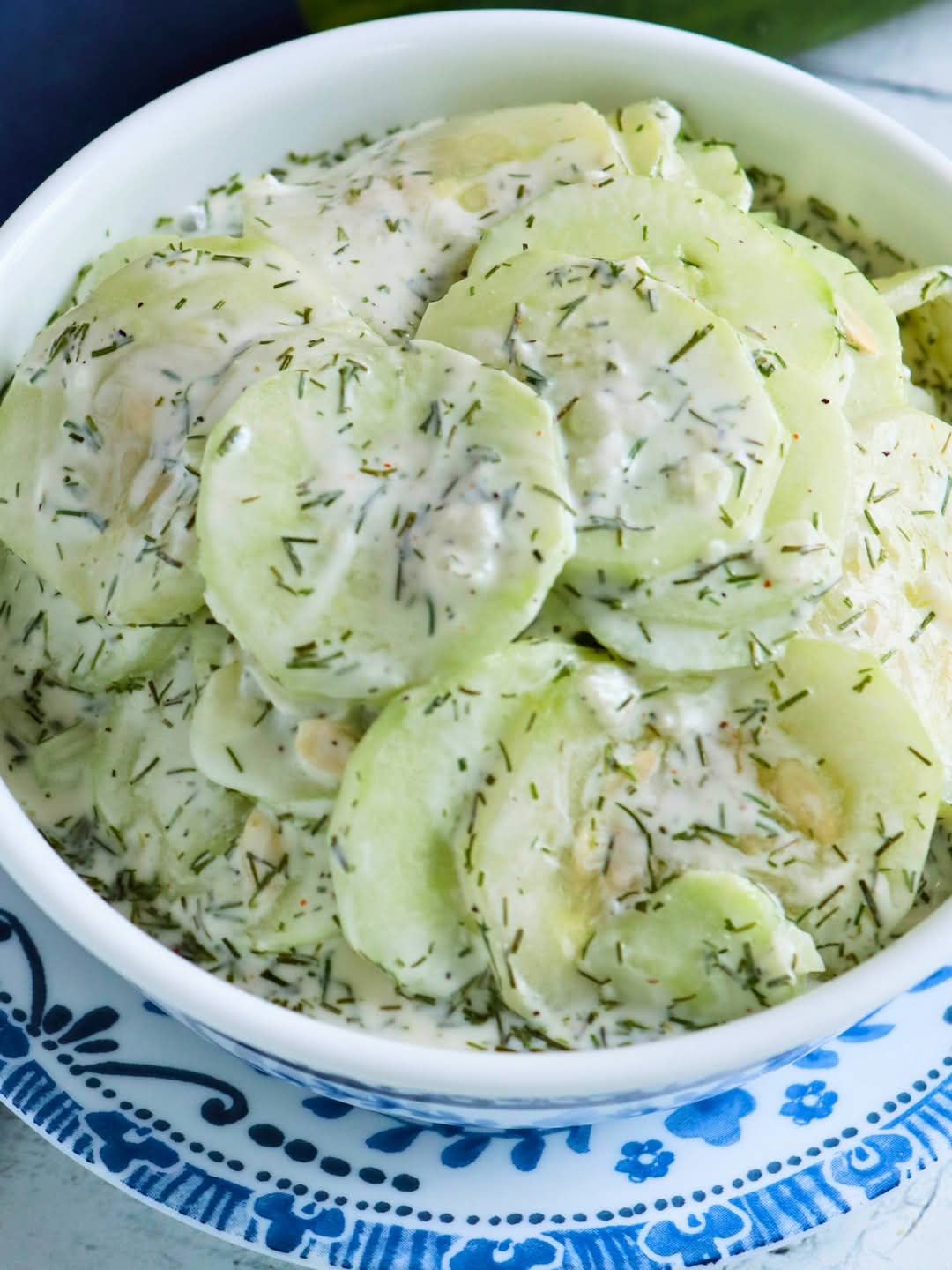Traditional Polish Sour Cream, Dill, and Cucumber Salad (Mizeria)
Introduction
Mizeria, a simple yet flavorful cucumber salad, has been a staple on Polish tables for centuries. This refreshing dish combines crisp cucumbers, tangy sour cream, and fragrant dill to create a perfect side dish for hearty Polish meals. The name Mizeria translates to “misery” in Polish, though its exact origin is debated. Some say it refers to the humble, inexpensive ingredients, while others believe it reflects the bittersweet taste of nostalgia for those who left Poland and missed their homeland. Despite the name, this salad is anything but miserable—it’s creamy, cool, and packed with fresh flavor, making it a favorite among Polish families for generations.
Ingredients
- 2 large cucumbers (English or Persian cucumbers preferred)
- 1 teaspoon salt (for sweating the cucumbers)
- ½ cup sour cream (or Greek yogurt for a lighter version)
- 2 tablespoons fresh dill, finely chopped
- 1 tablespoon white vinegar or lemon juice
- ½ teaspoon sugar (optional, for balance)
- ¼ teaspoon black pepper
- 1 small clove garlic, minced (optional, for extra depth)
- 1 tablespoon red onion or shallot, finely diced (optional)
Instructions
Step 1: Prepare the Cucumbers
- Wash and thinly slice the cucumbers. You can use a knife or a mandoline for even slices.
- Place the sliced cucumbers in a colander and sprinkle with salt. Toss gently and let them sit for about 15 minutes to release excess water.
- After 15 minutes, rinse the cucumbers under cold water and pat them dry with a paper towel.
Step 2: Prepare the Dressing
- In a mixing bowl, combine sour cream, fresh dill, vinegar or lemon juice, sugar (if using), black pepper, and minced garlic (if using). Stir well to create a smooth dressing.
Step 3: Assemble the Salad
- Add the cucumbers and red onion (if using) to the bowl with the dressing.
- Gently mix everything together until the cucumbers are evenly coated.
Step 4: Chill and Serve
- For best flavor, cover the salad and refrigerate for at least 30 minutes before serving. This allows the flavors to meld beautifully.
- Serve chilled as a refreshing side dish with traditional Polish dishes like pierogi, kielbasa, or grilled meats.
History of Mizeria
Mizeria dates back to at least the 16th century and is believed to have been introduced to Poland by Italian Queen Bona Sforza, who brought many vegetables, including cucumbers, to Polish cuisine. It quickly became a beloved dish across Poland, appearing on both peasant and noble tables. Over the centuries, different regions of Poland have put their own spin on Mizeria, sometimes adding onions, garlic, or even hard-boiled eggs.
Health Benefits
This cucumber salad is not only delicious but also packed with health benefits:
- Hydration: Cucumbers are over 95% water, keeping you refreshed.
- Digestive Health: Dill and cucumbers support digestion and gut health.
- Probiotic Boost: If you use fermented sour cream, you get beneficial probiotics.
- Low-Calorie: A great, guilt-free side dish with healthy fats from sour cream.
- Rich in Antioxidants: Cucumbers and dill contain vitamins A and C, supporting immunity.
Nutritional Information (Per Serving)
- Calories: ~80
- Protein: 2g
- Carbohydrates: 6g
- Fiber: 1g
- Fat: 5g
- Sodium: 200mg (varies based on salt use)
Who Loves Mizeria?
Mizeria is cherished by many:
- Polish Families: A nostalgic dish tied to childhood and home-cooked meals.
- Vegetarians: A delicious, meat-free side dish.
- Health-Conscious Eaters: Low in calories but packed with nutrients.
- Food Enthusiasts: Lovers of Eastern European cuisine appreciate its simplicity.
Conclusion
Mizeria is a timeless Polish dish that has stood the test of time. Its refreshing taste, creamy texture, and easy preparation make it a favorite at Polish tables and beyond. Whether you grew up eating it or are trying it for the first time, this cucumber salad brings a taste of Polish tradition to any meal.
Would you like any variations, such as a non-dairy version or additional seasonings?
